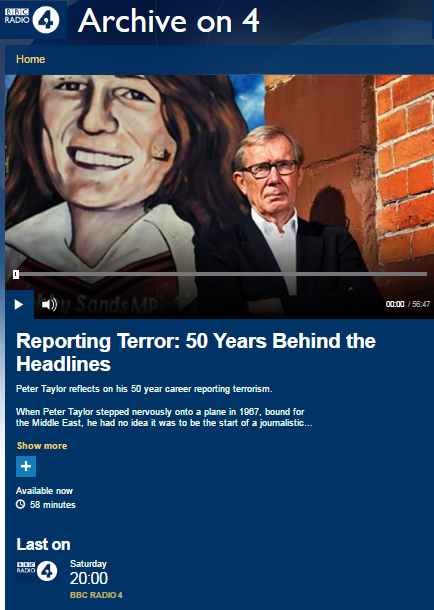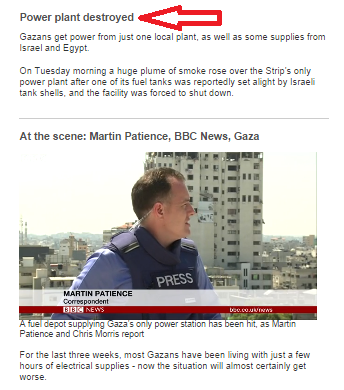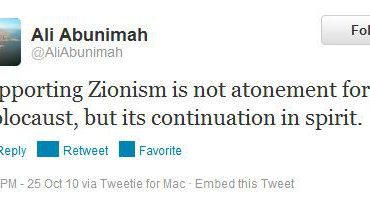Veteran BBC journalist Peter Taylor recently produced written and audio reports relating to his long career reporting terrorism.
The BBC News website’s UK page published an article titled “Peter Taylor: How has terror changed in 50 years?” on March 31st, the majority of which relates to Northern Ireland.
The April 1st edition of BBC Radio 4’s ‘Archive on 4’ programme was titled “Reporting Terror: 50 Years Behind the Headlines” and its synopsis reads as follows:
“Peter Taylor reflects on his 50 year career reporting terrorism.
When Peter Taylor stepped nervously onto a plane in 1967, bound for the Middle East, he had no idea it was to be the start of a journalistic mission he would still be pursuing fifty years later.
At the time “terrorism” was barely in our vocabulary. In the hundred or so documentaries he has made on the subject since then, Peter has tried to get behind the headlines to understand and explain a phenomenon which has grown to affect us all.
Peter has reported the escalation of terrorism from the IRA and its Loyalist counterparts to Al Qaeda and the so called Islamic State. He has met the victims of terror, those involved in perpetrating terrorist acts and members of the intelligence services tasked with stopping them.
Revisiting his own extraordinary archive has given Peter the chance to reflect on the evolution of terrorism and to recall some of his most memorable interviews.
“There are moments when the interviews are chilling, moments when they’re shocking and at other points they provoked a sharp intake of breath – surprising me by how prophetic they were.””
Significantly, Taylor made no attempt to define terrorism during that almost one hour-long programme, telling listeners at one point that it is “open to different definitions”.
However, at 05:31 minutes into the programme, Taylor did provide listeners with the sole example of what he termed ‘state terrorism’.
“Terrorism can mean different things to different people; it isn’t black and white. States allegedly resort to it too, as Israel did to avenge the 1972 Munich Olympic Games massacre. Eleven Israeli athletes died following an attack by Palestinians from a shadowy group known as Black September. In revenge, Israel’s intelligence agency, the Mossad, covertly assassinated those suspected of involvement in the attack. […]
The Mossad assassinated at least eleven of its targets. Since then, Palestinian attacks on Israelis have continued and Israel has continued to retaliate with targeted killings; a tactic more recently replicated in Western drone strikes against IS and Al Qaeda.”
However, when Taylor later (at 21:07) described a British response to terror attacks he did not categorise it as ‘state terror’.
“In the wake of Brighton and other IRA atrocities, the Brits hit back. The SAS was the cutting edge. Between 1983 and 1992 they shot dead 28 IRA suspects.”
As we know, the BBC’s ‘rationale’ for avoiding the use of the word terror and its derivatives is that the term “carries value judgements” and so it comes as no surprise to see the perpetrators of the Munich Olympics massacre described – as usual – without that word being used.
However, the BBC is clearly nowhere near as reluctant to make a “value judgement” concerning Israel’s response to acts of terrorism – but, notably, refrains from describing its own government’s very similar actions in the same terms.
Related Articles:
BBC still won’t call Munich Olympics massacre perpetrators terrorists
BBC finds a ‘working definition’ for terrorism in Europe
Radio 4 gives insight into BBC avoidance of the use of the term ‘terror’ in Israel




